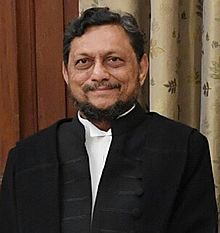Sharad Bobde facts for kids
Quick facts for kids
Sharad Arvind Bobde
|
|
|---|---|
 |
|
| 47th Chief Justice of India | |
| In office 18 November 2019 – 23 April 2021 |
|
| President | Ram Nath Kovind |
| Preceded by | Ranjan Gogoi |
| Succeeded by | N. V. Ramana |
| Judge of the Supreme Court of India | |
| In office 12 April 2013 – 17 November 2019 |
|
| Nominated by | Altamas Kabir |
| Appointed by | Pranab Mukherjee |
| 21st Chief Justice of the Madhya Pradesh High Court | |
| In office 16 October 2012 – 11 April 2013 |
|
| Nominated by | Altamas Kabir |
| Appointed by | Pranab Mukherjee |
| Preceded by | Syed Rafat Alam |
| Succeeded by | Ajay Manikrao Khanwilkar |
| Judge of the Bombay High Court | |
| In office 29 March 2000 – 15 October 2012 |
|
| Nominated by | Adarsh Sein Anand |
| Appointed by | K. R. Narayanan |
| Personal details | |
| Born | 24 April 1956 Nagpur, Maharashtra, India |
| Spouse | Kamini Bobde |
| Children | 3 |
| Alma mater | Nagpur University (BA, LLB) |
Sharad Arvind Bobde (born 24 April 1956) is an Indian judge. He served as the 47th Chief Justice of India. This is the highest judicial position in India. He held this important role from November 18, 2019, to April 23, 2021.
Before becoming the Chief Justice of India, he was the Chief Justice of the Madhya Pradesh High Court. He also served as the Chancellor for two important law universities in Maharashtra. Justice Bobde was a judge in the Supreme Court of India for eight years. He retired on April 23, 2021. After his retirement, N. V. Ramana became the next Chief Justice of India.
Contents
Family and Early Life
Sharad Arvind Bobde comes from a Marathi family in Nagpur, India. His family has a long history in law. His great-grandfather, Ramachandra Pant Bobde, was a well-known lawyer. He practiced law between 1880 and 1900.
His grandfather, Shrinivas Ramachandra Bobde, was also a lawyer. Sharad Bobde's father, Arvind Shrinivas Bobde, served as the advocate-general of Maharashtra in the 1980s. His elder brother, Vinod Arvind Bobde, was a senior lawyer in the Supreme Court. He was an expert in constitutional law.
Education
Sharad Bobde went to St. Francis De'Sales High School in Nagpur. He completed his college degree at the St. Francis De Sales College, Nagpur. He then studied law at Dr. Ambedkar Law College, which is part of Nagpur University.
Career in Law
Sharad Bobde started his legal career on September 13, 1978. He worked as a lawyer at the Nagpur Bench of the Bombay High Court. He also appeared before the main court in Bombay and the Supreme Court of India. In 1998, he became a Senior Advocate, which is a special title for experienced lawyers.
On March 29, 2000, he was appointed as an additional judge of the Bombay High Court. He then became the Chief Justice of the Madhya Pradesh High Court on October 16, 2012. Later, on April 12, 2013, he was promoted to a judge of the Supreme Court of India.
He became the 47th Chief Justice of India on November 18, 2019. He took over from Ranjan Gogoi. During his time as Chief Justice, he served for about one year and five months. As a judge of the Supreme Court, he wrote 68 judgments. He was part of the bench for 547 cases. He wrote the most judgments on Criminal Law.
Important Decisions
Justice Bobde was part of many important legal decisions during his time as a judge. These decisions helped shape laws and how they are applied in India.
Ayodhya Land Dispute
Justice Bobde was part of a special group of five judges. This group heard and decided the Ram Janmabhoomi-Babri Masjid land dispute case. Their decision was made on November 9, 2019. The judges decided that a Hindu Temple could be built on the disputed land. They also stated that the destruction of the Babri Masjid in 1992 was against the law.
Aadhaar National ID
Justice Bobde was on a three-judge bench that looked at the Aadhaar system. Aadhaar is a unique identification number for Indian citizens. The judges confirmed that no Indian citizen should be denied basic services or government help just because they do not have an Aadhaar card. This means essential services must be available to everyone.
Protecting Religious Feelings
In 2017, Justice Bobde was part of a two-judge bench. This bench supported a ban by the Karnataka Government on a book. The book was called Basava Vachana Deepthi. The ban was upheld because the book was believed to upset the religious feelings of the Veerashaiva community.
Environment and Air Quality
In 2016, Justice Bobde was on a three-judge bench. This group of judges made a decision about air pollution in the National Capital Region. Because of the very bad air quality, they stopped the sale of firecrackers in that area. This decision aimed to help reduce air pollution.
Appointing Judges
As Chief Justice, Bobde led a three-judge bench. This bench included Justices Sanjay Kishan Kaul and Surya Kant. They gave clear instructions to make the process of appointing high court judges smoother. They also set specific time limits for these appointments.
 | Dorothy Vaughan |
 | Charles Henry Turner |
 | Hildrus Poindexter |
 | Henry Cecil McBay |

